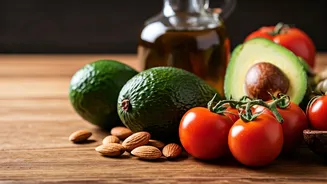HDL Cholesterol Basics
HDL cholesterol plays a crucial role in cardiovascular well-being. Its primary function is to transport cholesterol from the arteries back to the liver,
where it can be eliminated. This process helps prevent the build-up of plaque in the arteries, thus lowering the risk of heart disease and stroke. Higher levels of HDL are generally considered beneficial, while lower levels can increase the risk of heart-related problems. Maintaining a healthy level of HDL cholesterol is a key aspect of a comprehensive approach to heart health, alongside other lifestyle factors such as diet and exercise.
Olive Oil's Power
Extra virgin olive oil stands out as a heart-healthy choice. Rich in monounsaturated fats, it helps boost HDL cholesterol. This type of fat not only improves cholesterol profiles but also reduces inflammation, another factor in heart disease. Incorporating olive oil into your diet is relatively simple; use it for cooking, drizzling over salads, or as a dipping sauce for bread. Opting for extra virgin olive oil ensures the highest levels of beneficial antioxidants, maximizing its health benefits.
Avocados: Healthy Fats
Avocados are another excellent source of monounsaturated fats, offering similar benefits to olive oil regarding HDL cholesterol. They are also packed with fiber, which helps to lower overall cholesterol levels by reducing the absorption of cholesterol from food. These creamy fruits are versatile; they can be added to salads, used in smoothies, or spread on toast. Including avocados regularly in your diet is a tasty way to support healthy cholesterol levels and enhance your overall nutrition.
Fatty Fish Benefits
Fatty fish, such as salmon, mackerel, and sardines, are rich in omega-3 fatty acids. These essential fats are known to increase HDL cholesterol levels while also reducing triglycerides, another type of fat in the blood that can raise heart disease risk. Omega-3s also have anti-inflammatory properties, further supporting heart health. Aim to include fatty fish in your diet at least twice a week, prepared through grilling, baking, or steaming to maintain optimal nutritional value.
Nuts and Seeds
Nuts and seeds provide a combination of healthy fats, fiber, and plant sterols, all contributing to improved cholesterol levels. Almonds, walnuts, chia seeds, and flax seeds are particularly beneficial. They can increase HDL cholesterol and help lower LDL (bad) cholesterol. Enjoy a handful of nuts as a snack, add seeds to your breakfast cereal, or sprinkle them on salads. However, be mindful of portion sizes as nuts and seeds are calorie-dense.
Whole Grains Power
Whole grains, like oats and quinoa, contain soluble fiber that helps lower LDL cholesterol while also potentially increasing HDL. They also provide various nutrients and contribute to feeling full, which can help with weight management. Starting your day with a bowl of oatmeal or incorporating quinoa into your lunch can be simple yet effective ways to boost your heart health. Always choose whole grains over refined grains to maximize the benefits.
Legumes: Versatile Helpers
Legumes such as beans, lentils, and chickpeas are packed with soluble fiber and protein, both beneficial for heart health. They help lower LDL cholesterol and may also contribute to a slight increase in HDL cholesterol. Legumes are incredibly versatile; they can be added to soups, stews, salads, or used as a meat substitute in various dishes. Including legumes regularly in your diet provides significant health benefits while being a budget-friendly food choice.













